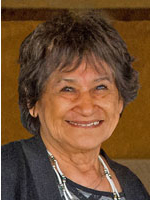By Lorraine Loomis, Chair, Northwest Indian Fisheries Commission
I am glad that the treaty tribes in western Washington were finally able to reach agreement with the state on a package of conservative salmon fisheries for Puget Sound. It took more than a month of overtime negotiations to make it happen, but cooperative co-management showed us the way.
Western Washington is unique because 20 treaty Indian tribes and the state Department of Fish and Wildlife jointly manage the salmon resource and share the harvestable number of fish returning each year.
That job was a lot easier when there were more fish to go around. But salmon populations have been declining steadily for decades because their habitat is disappearing faster than it can be restored. Salmon returns the past couple of years – especially coho – have taken a sharp turn for the worse.
Some say just stop fishing and that will fix the problem. It won’t. From birth to death, habitat is the single most important aspect of a salmon’s life. As the habitat goes, so go the salmon and tribal culture and their treaty fishing rights.
For millions of years, salmon were abundant in western Washington. Their sheer numbers, naturally high productivity and good habitat provided resiliency from the effects of disease, drought and a host of other environmental factors. We must rebuild that resilience.
As salmon populations grow smaller, management becomes increasingly difficult, and the co-managers struggle to divide a steadily shrinking pie. We must make the pie bigger.
The non-stop loss of salmon habitat in western Washington must be halted so that our habitat restoration efforts can successfully increase natural salmon production. In the meantime, we need to rely on hatcheries to provide for harvest and help offset the continuing loss of habitat.
We also must build resiliency in the co-manager relationship created by the 1974 ruling in U.S. v. Washington that upheld tribal treaty-reserved rights and established the tribes as salmon co-managers.
We remember the bad old days of the late ’70s and early ’80s when the tribal and state co-manager relationship was new and mistrust ran deep. We spent a lot of time, money and energy fighting one another in federal court hearings rather than focusing together on the resource.
Things didn’t begin to change until former state Fish and Wildlife director Bill Wilkerson said enough was enough and sat down with the late NWIFC Chairman Billy Frank Jr. The result was the birth of cooperative co-management in 1984 which led to the annual development of agreed fishing plans that allowed the tribes and state to focus on managing the fish instead of fighting each other in court.
This year, for the first time in more than three decades, the tribal and state co-managers failed to reach agreement on a joint package of Puget Sound salmon fisheries within the North of Falcon process timeframe. Instead we developed separate fishing plans for consideration by NOAA Fisheries under their ESA authority.
But in the true spirit of co-management, we kept the door open to further negotiations, and it worked. We weathered the storm together and we are stronger for it.
We know our relationship will be tested again in the years to come. But this year has shown us that we can survive those challenges as long as we keep cooperation at the heart of co-management.


